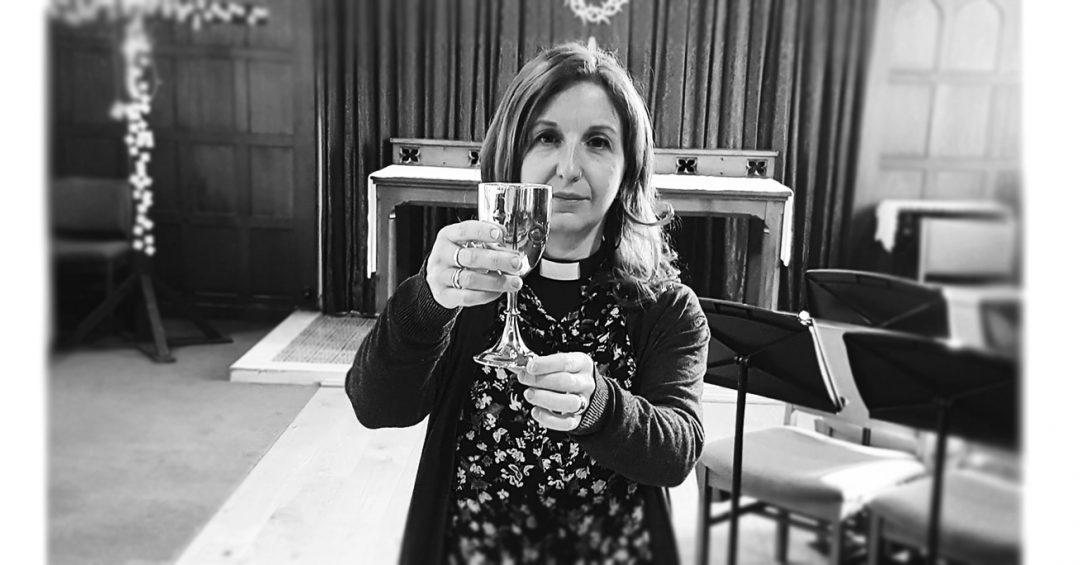This week my church announced we are appointing a female incumbent. We have had female clergy before (including me of course) but never a woman completely in charge. I understand that for some this might be difficult news to hear, though I am still saddened and somewhat frustrated that this conversation is still necessary in 2021. A few people within the church have asked questions and whilst I am tempted to point them to the numerous articles and books that have been written on the subject of women in ministry, I also recognise that hearing a view from someone you already know can be more helpful, and so here I am tapping away at the keyboard…
This piece of writing is not intended to change the hearts and minds of those who have already formed a position on women in leadership, of those who have looked at the theology or history and tradition and made up their minds from an educated viewpoint. No, this is written for those who are facing the prospect of a female incumbent for the first time and are not sure how they feel about it; it’s for those who have been told that women do not have the authority to lead a church but have never really explored that view for themselves; and it is written from the perspective that it is both right and acceptable that women can and should lead churches, preach and minister.
This is really a very short and simplified overview of some of the key points as I see them, there is much more said on this debate elsewhere and much I have not included, so if you’d like to delve deeper there are some resources mentioned at the end, again there are many more, just use Google. Finally before I dig in, let me just say that I have no desire to discuss why you might think I am wrong, that’s your prerogative but I won’t be engaging, I don’t need to prove myself. If you are a member of my church and would genuinely like to talk about this further in a positive light, you are welcome to get in touch.
The debate on female ordination/women in church leadership has raged for some time but it may be helpful to know that whilst we might find ourselves in the Church of England in which we have had female priests for over 25 years, we’re actually rather behind. For example, the Salvation Army had female leaders from the very start in 1878 and Assemblies of God also ordained women from their inception in 1914. Aside from this there were a handful of female leaders ordained in the 19th Century, largely to free churches which were self governing; in the Methodist Church in the UK women have been deacons since 1890 but only Presbyters since 1974; and for Baptists it varies, but in the UK the first recognised female minister was in 1918.
For many of us scripture is our line of authority on this subject. In evangelical church circles the view that women should not be ordained is largely based on some key scriptures. However as we find in many theological discussions, there isn’t always a clear answer here, if there were there would be little need for me to write this. There are verses quoted that seem to say women should not be in leadership, or preaching or should be quiet, and yet there are also some key examples of women who clearly were important figures or leaders. We must also look at context and seek to understand what was being written, to whom and why? We might look for the underlying themes or messages too, what did Jesus do or model for example? I’ll come back to that in a moment.
One view (shared by the Roman Catholic church) for why women should not be ordained comes from the view that Jesus was male and his disciples were male, therefore it is not right or even possible for a woman to take on this role. Despite ongoing debates, various Popes over the years have reinforced this.
There is also the question of ‘apostolic line or ‘apostolic succession’, the direct line of authority as bestowed on Bishops ever since St Peter. All Roman Catholic priests have been ordained by a male Bishop who can trace their lineage back to St Peter, to the original apostles, and therefore, it is believed, preserves true doctrine. Historically those who claimed to be leaders but could not prove their line of apostolic succession would be called heretics. There are those within the Church of England that still maintain that apostolic line and are therefore opposed to women bishops and prefer episcopal oversight from someone else who does not support female ordination.
Heading in to scripture now, in order to hold to the view of apostolic succession or tradition, we have to accept that Jesus did not want women to be leaders in his church. Yet, there are several examples of female leaders in scripture and of Jesus travelling and ministering with women. In the Old Testament we might refer to the Deborah as a start, a prophetess and judge in a great position of authority; or Miriam, who worked with Aaron and Moses. In the New Testament we might start with Mary Magdalene for example. We know she travelled widely with Jesus and can be read about in all four gospels. In Luke 8 we read that she supported his ministry financially. She was there at his crucifixion (when most male disciples were not) and at his burial. In all four gospels she is listed as being present and amongst the first to see Jesus after the resurrection. In John and Mark’s gospels she is the first to see him and in John she is told to share the good news with the disciples. Because of all this she is often referred to as ‘apostle to the apostles’.
Here is a woman who scripture tells us walked closely with Jesus during his ministry and was chosen to either be the first or be amongst the first to see him risen, as well as being told to go and share the news that he has risen – the heart of the gospel itself.
If we look at Jesus’ own behaviour and attitudes we see a man who broke societal norms regularly, did not stand for the status quo and challenged the faith leaders of the day. He crossed lines of social and religious proprietary, his actions often challenging the traditions of the people. (This line came from an essay by Sharon Pearson that I read years ago and now do not have the link for, apologies). And I love the story of Mary & Martha too, where Jesus effectively rebukes Martha for doing the traditional work that her womanly role dictated at that time, saying ‘only one thing is needed, Mary has chosen what is better…’ (Luke 10:38-42). She has chosen to sit at his feet and learn from him.
If we look further into the New Testament, writer of Romans, St Paul, is often slated as being misogynistic and anti-women, and verses from some of his letters are often quoted against women in leadership, but despite some difficult passages I generally find him to be pretty pro-women. Romans 16 for example, starts off by ‘commending Phoebe, [clearly a woman] a deacon (or minister)’. He goes on, to mention Priscilla, whose name occurs before her husband’s in several places, which is almost unheard of. The man’s name was always put first and Paul would have known this, he would not have made a simple mistake like this, it had to be intentional, and seems to offer a sense of her having more authority here. It is clear from the mentions of them that they have worked together, and that they ran a church together in their own home. Paul goes on to mention in Romans 16: Mary who ‘worked hard’; Tryphena and Tryphosa, ‘women who work hard in the Lord’; Persis, another woman who has worked very hard in the Lord, the mother of Rufus and Julia, the sister of Nereus.
We might look too, to Junia, also mentioned by Paul, (read about her in Scott McKnight’s Junia is not alone) who was a female apostle that for years was thought of as a man because of a mistranslation at the hands of one man and made popular by Martin Luther. In fact until 1927, no New Testament translation had Junia as anything other than a female name. McKnight suggests that the reason Junia became known as a man was simply because it was inconceivable to later church scholars that an apostle could be a woman. Sigh…
Taking a step back into the Old Testament, sometimes an argument is made that God made woman as a ‘helper’ to Adam rather than an equal. Yet scholar and academic Rev Dr Ian Paul creates a good argument for Adam & Eve being created equal (read his Women in Authority Grove Booklet). As he points out, the word ‘ezer’ which is translated as ‘helper’ when referring to Eve, is actually used on many occasions in the Old Testament. Over half of those uses refer to God as ‘ezer’ in relation to the people, so clearly ‘ezer’ should not be a lesser role.
Now, a brief word on the negatives. There are various passages from some of Paul’s letters that are often cited for example suggesting women should be silent or submit, or not teach. These passages are problematic and in some cases even contradict one another. We must remember that when we read Paul, his writings are actually letters and we are only hearing half the story – we don’t know what he is responding to or what particular issues there have been in any one church that he feels he should address. As one example, the passage from the New Testament that most gets commonly quoted is: 1 Tim 2:11-12:
A woman should learn in quietness and full submission. I do not permit a woman to teach or to assume authority over a man; she must be quiet.
Remember, we already know that Paul has mentioned women in ministry roles in Romans and other places, we know he has mentioned women praying and prophesying (1 Corinthians 11) we know in Acts 18 that Priscilla is referred to as having ‘explained the way of God’ to Apollos (clearly teaching him then). He mentions other women too who have obviously been working in ministry, so we know he isn’t against women in ministry completely. We know also this is a letter specifically to Timothy, and may be relating to a particular context in which Timothy is ministering. Simply, we don’t know if there is something specific Paul is referring to here.
However if we were going to take this point literally then why not everything else? He does not actually say a woman cannot teach the gospel, it just says ‘teach’. But the church now doesn’t object to women being teachers does it? In fact in years gone by teaching was an admirable profession that women were encouraged to go in to. The full passage suggests that women should not braid their hair or wear gold or pearls or expensive clothes. Do you hear parts of the church telling women not to wear gold? or not to wear expensive clothes? No. So why do some pick on the one bit about teaching in order to make a point – it really doesn’t stand up.
As I mentioned above one must look at the context and social circumstances surrounding them at the time. It is fair to say that it was not common for women to be in positions of power or authority, however there were some and some are referred to in the bible as we have seen.
In summary, I believe the arguments against women in leadership are flawed. I don’t believe there is anything in The Bible that indisputably says women should not be in positions of leadership. In fact I believe Jesus and Paul were supportive of, even encouraging of, women in ministry and challenged the norms of the day in this and other ways. I believe that if we do not include women in ministry roles we are missing a whole heap of spirit filled skills and God given gifts from our church leadership.
Just a few resources – there are many out there
Books
‘Women & Authority’ by Ian Paul (a short Grove booklet)
‘Junia is not Alone’ by Scott McKnight
‘Women in a Patriarchal World’ by Elaine Storkey
‘Powerful & free’ by Danny Silk
‘Rediscovering Scripture’s Vision for Women’ by Lucy Peppiatt
An interview with Tom Wright on women in ministry:
Articles
From Ian Paul:
The one thing women leaders in the Bible had in common
What’s going on with 1 Corinthians 14?
From Marg Mowckzo:





1 Comment
Daphne
August 25, 2021 at 4:54 pmThanks Jules.